A Conversation With Jane Yolen
by Claire E. White
She is "the Hans Christen Anderson of America"

|
Jane says that it seems like she's been writing since birth; she started writing poetry before she went to school. In first grade, she wrote the class musical, both the words and the music. The play was about a bunch of vegetables that got together to make a salad. She played the chief carrot. While she was in junior high school, she wrote an entire essay in rhyme about manufacturing in New York State. In high school, she won a Scholastic poetry contest. While she attended Smith College, she wrote newspaper articles and songs. She sold her first book on her 21st birthday: a nonfiction book about women pirates; Pirates in Petticoats. She never looked back, and has been writing ever since. Some of her books include Owl Moon (Putnam/Philomel), Favorite Folktales From Around the World (Pantheon Books), Gray Heroes (Viking), Mirror, Mirror (Viking), The Devil's Arithmetic (Viking), Dragon's Boy (HarperCollins), Where Have the Unicorns Gone? (Simon and Schuster) Young Heroes: Odysseus in the Serpent Maze (HarperCollins), How Do Dinosaurs Say Goodnight? (Scholastic), and many, many other titles.
She is equally at home writing poetry or prose, nonfiction or fiction, adult or children's books. She is known for her skills at rhyming, her creativity and her skills at characterization.
In 1999, Dustin Hoffman made her award-winning Holocaust time travel novel, The Devil's Arithmetic, into an original movie for Showtime. The film starred Kirsten Dunst, Brittany Murphy, Mimi Rogers and Louise Fletcher, and won an Emmy for Best Director. In between writing books, Jane has also been an editor, a teacher, a storyteller, a critic, a songwriter for rock groups and folk singers; as well as a mother and a grandmother. She has been married for 35 years to Dr. David Stemple, Professor Emeritus in the Computer Science Department of the University of Massachusett at Amherst.
Among Jane Yolen's many awards are the Caldecott Medal, two Nebula Awards, the Rhysling, an Asimov's Magazine Reader's Poll award, World Fantasy Award, a National Book Award nomination, three Mythopoeic Fantasy Awards, the Golden Kite Award, the Skylark Award, Jewish Book Award, two Christopher Medals, the Association of Jewish Libraries Award, the Charlotte Award, the Garden State Award, and the Golden Sower Award.
A sought-after speaker and lecturer across the country, she is past president of the Science Fiction Writers of America, and has served on the Board of Directors of the Society of Children's Book Writers and Illustrators since its inception. Born in New York City, she earned a B.A. degree from Smith College and a M.Ed. degree from the University of Massachusetts. She and her husband David divide their time between homes in Hatfield, Massachusetts and St. Andrews, Scotland. She is currently at work on several new book projects.
Jane spoke to us about her incredible career, and the reason that the myth of The Firebird holds such a special place in her heart. She also shares the seven rules that every aspiring writer should memorize.
It's clear that you have a very good work ethic, with over 200 books published. Would you take us through a typical writing day for you? Do you keep a set schedule; what have you found works best for you over the years?
I work every day, sitting at least several hours at the computer and actually getting something anything down on the page. Good days I will write for ten hours, but that is unusual.
But much of a writer's writing life is in what I called "gathering." So getting out, reading, walking, seeing, listening, are all part of the writer's day.
My usual writing-down gets done mornings.
Is this a good or bad time to be getting into publishing?
Do you remember the dream of Pharaoh:
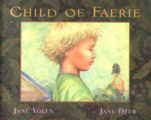
|
Behold in my dream I was standing on the banks of the Nile; and seven cows fat and sleek, came up out of the Nile and fed in the reed grass; and seven other cows came up after them, poor and very gaunt and thin, such as I had never seen before in the land of Egypt. And the thin and gaunt cows ate up the fat cows, but when they had eaten them, no one would have known that they had eaten them, for they were still as gaunt as at the beginning.I believe Pharaoh was a publisher and he was dreaming about the troubling world for writers. Do I hear an amen? In the 60s and 70s and yeah -- even into the 80s, we writers were all part of those fat cows. And we ate grass and frolicked in the warm sun, and never gave thought to the future. And then along came those seven gaunt cows. I shall name them: Multi-national companies, Barnes & Noble; Thor Power Tool Amendment, zero dollars to school libraries, overproduction of books, television-driven merchandise, and the super-saturation of slush piles by desperate wannabee writers sending multiple submissions.
The publishers responded to this famine situation by (in the last five years) deep and devastating cuts in their lists, firing their editors (both junior and senior), further amalgamating with other publishers, and closing their doors to unsolicited and unagented manuscripts.
| "Prioritizing is something I have learned. As a young writer, I thought all my ideas equally viable and valuable. Now I know better and tend my aging garden with care." |
But remember -- after the seven gaunt cows, will come seven fat cows. Or maybe seven sleek but not quite fat cows. I believe this is already starting to happen. Why in the last two years, in the two online writing groups I am part of, several of the people sold their first books. And I recently heard from a pair of my Centrum students who had never sold any fiction in the twelve years since they had first been in my workshop. They had sold a picture book -- and to a major publishing company, too.
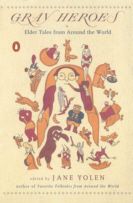
|
I think parents should always be available to talk with their kids about what they are reading and watching. Not so much censoring as aware.
And yes -- there is too much sex and violence available for children.
In your book, Gray Heroes: Elder Tales from Around the World, you explored how the older heroes can still defeat the enemy, find true love and save the day. What originally attracted you to this project?
I was approaching sixty. In one of the online groups I was in, someone mentioned a couple of folk stories about old age. I wondered if I could read them in some volume of similar stories, and no such volume existed. Well, I thought, why not. . .
As America ages demographically over the next twenty years, what effects do you think this will have on our society?
More warehousing of pensioners, more problems with medical insurance; loss of cultural and historical memory.
As a former editor, what turned you off about a submitted story? Any pet peeves?
Here were my pet peeves:
1. "Cute" cover letters, or cover letters that tell me how wonderful, brilliant, or important the story is.
2. Info dumps at the beginning of the story, information simply given to the reader instead of teased out in scenes and dialogue and action.
3. Characters that don't grow.
4. No realized setting, no outer landscape that has something to do with the inner landscape of the characters.
5. Flat language.
6. Convoluted sentences, with only semi-colons as an aid to reading them.
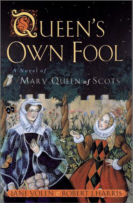
|
Learn to value the process, not the product.
Smell the grandbabies.
Enjoy the moment.
Prioritize.
You've mentioned that you had 113 rejections before you sold your first poem. What kept you going during that time? What do you love most about poetry?
Kept me going? No one could have stopped me. I love to write.
I love the compressed universes (pun intended) of poetry. I love the singability of it. Poetry is making coal into diamonds, but never forgetting the dark power of the coal.
Today, once a writer gets her first book published, that is only the beginning -- then she has to get involved with publicity. What tips do you have for newly published authors about publicity, book signings, or how to handle one's self with the media?
Don't take yourself (or the interviewer) too seriously. Remember that if you say it, they will publish it. Learn about sound bites. Relax and enjoy it.
One of the problems that the Internet has exacerbated is copyright violation and theft of an author's and musician's works. Have you had any experience with this issue? How did you handle it?
I have a letter on my computer to anyone who pirates my work. It is firm but charming and explains copyright. Most of the people who have put my stuff on line are fans and don't know any better. The real pirates get letters from my agent or publishers' lawyers, as well as the lawyers attached to the three writers' groups I belong to: SFWA (Science Fiction/Fantasy Writers of America) SCBWI (Society of Children's Book Writers and Illustrators) and The Authors' Guild.
As a writing teacher and former college professor, what are the most common mistakes that you saw young writers make when writing fiction?
| "I would remind you of something that Churchill told a group of school boys: 'Never give up. Never give up. Never, never, never give up.'" |
Then finishing it with as much power as it was begun.
Then misunderstanding that fiction should be about the growth of wisdom. Not about the writer showing off.
Fourth, and probably the thing one sees most often, is a problem with transitions between scenes, between chapters.
You have had your work illustrated by scores of different illustrators. Have you generally been pleased with the artists' interpretation of your work? Has any of the artwork ever surprised you in any way?
I am always surprised -- good artists seem to have that in common. And of the 235+ books I have done, there are only a handful -- literally -- that I don't like and don't show.
It is clear that you don't have a problem coming up with new ideas. But is it ever difficult to choose which one of your ideas to pursue next? Do you keep track of all your story ideas in a book or file?
Prioritizing is something I have learned. As a young writer, I thought all my ideas equally viable and valuable. Now I know better and tend my aging garden with care.
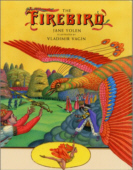
|
Frankly, I was asked.
Phoebe Yeh a young editor at HarperCollins (who had taken my college course when she was an undergrad at Amherst!) wrote to me saying she was working with a wonderful Russian artist named Vladmimir Vagin who wanted to illustrate Firebird but could not write. Would I be interested...?
Two things Phoebe did not know. First I had studied ballet at Balanchine's School of American Ballet back in the late 40s and early 50s, and had a great passion for the dancing of Maria Tallchief, his ex-wife and the greatest Firebird who ever danced the role. (It was created for her.) When she hung her practice tutu on my locker, and taught our class one day, I almost swooned.
Second, I had just purchased a Vagin picture at an auction for my granddaughter's Christmas/Chanukah present. It had arrived that morning!
What a strange bunch of coincidences. Of course I had to write the book.
The folktale of the Firebird has several different versions. How did you choose what to leave in and what to leave out of your story?
I had to start with the ballet. Then I went on to reread a number of versions of the folktale and work them in together.
What are your fondest memories of being a dance student at the Balanchine School of American Ballet?
When the school students could sit in on Saturdays when Balanchine worked with members of The Company on new ballets. But if you had to go to the bathroom and left the room, you were not allowed back in!
Did you send a copy of The Firebird to Maria Tallchief?
I have no idea where she lives.
I'd like to talk a bit about your young adult time travel book about the
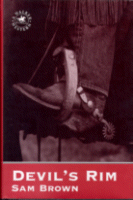
|
Most children I hear from have had the book presented to them in class, within the context of Holocaust studies, and still -- they tell me -- they were blown away by the book. That's because for young students, history comes alive when we concentrate on the end of the word -- hiSTORY.
Do you have any words of wisdom for writers?
No, but I have seven rules:
1. Write every day
2. Write what interests you.
3. Write for the child inside of you. (Or the adult, if you are writing adult books.)
4. Write with honest emotion
5. Be careful of being facile
6. Be wary of preaching
7. Be prepared for serendipity
Finally I would remind you of something that Churchill told a group of school boys: "Never give up. Never give up. Never, never, never give up."
Return to the June 2002 issue of The IWJ.
More from Writers Write
